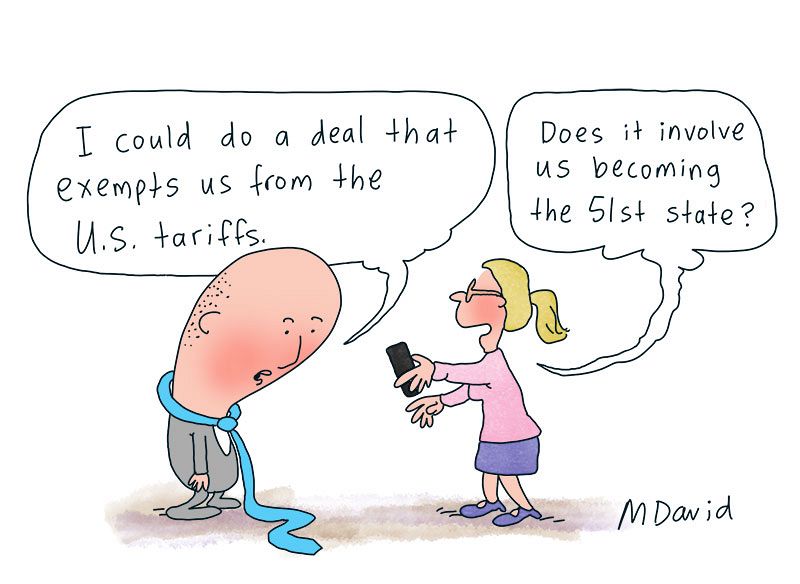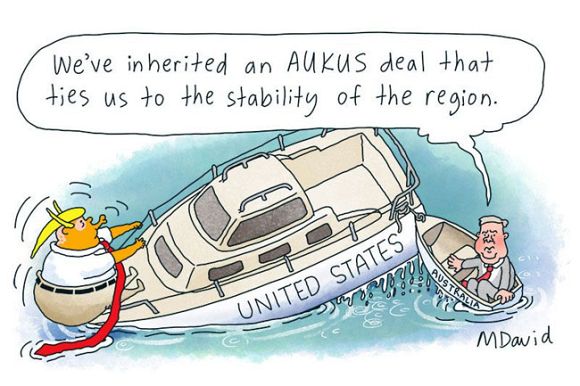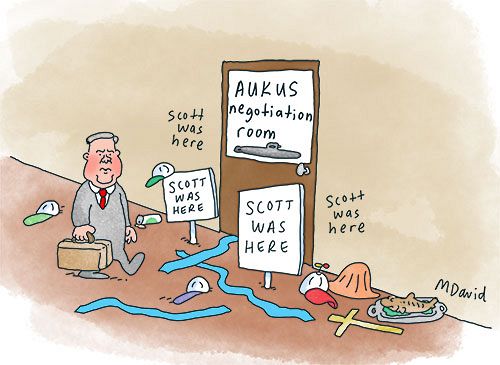A recent poll shows a seismic shift in voters’ views on Australia’s place in the world after Trump's re-election. Independent Australia discusses why Australian voters are becoming more independent as Election Day nears.
LAST SUNDAY, 27 April 2025, the ABC published the results of a survey it had commissioned from British-based polling organisation, YouGov, for the long-running Q&A program.
Whilst IA has strong, oft-expressed reservations about the veracity of opinion polls, which have consistently been shown to be staggeringly misleading, especially in an Australian context, the findings of this YouGov poll cannot be so easily dismissed. Firstly, because it was conducted on a very comprehensive (relatively large) sample of Australian voters (1,500). Secondly, because it indicated a shift in sentiment far too significant to be categorised as a mere statistical anomaly.
The topic was Australians' opinions about the nation’s relationship with the United States following Donald Trump’s return as American President.
The results of the YouGov poll have profound implications for this week’s Federal Election. Interestingly, they appear to have been largely overlooked by the mainstream media in the frenetic final week of the campaign. This article seeks to emend this regrettable oversight.
According to the ABC, respondents were asked three main questions*:
- Can Australia continue to rely on the United States for defence and national security?
- How concerned are you that President Trump’s policies will make Australia worse off?
- Who will best handle the relationship with President Trump in Australia’s interests?
But before we discuss the results of these questions, let’s first consider the broader factors that presumably led the ABC to commission a poll now about Australians' attitudes towards the United States, militarily and economically.
HOW DID WE GET HERE?
The 2025 Australian Federal Election comes at a time of great uncertainty.
Some of it lingers as an aftershock of the COVID pandemic earlier this decade, which worldwide caused mass panic, illness, death and an undercurrent of public dissent. To add insult to injury, vast economic disruption followed the virus, leading to stagflation — low economic growth and high inflation. People everywhere, including everyday Australians, have been hurting, literally and figuratively.
Of course, the wealth divide only grew during this period, where (mostly) U.S. billionaires – like Trump supporters and man-made climate change denialists and/or enablers, Musk and Bezos, who also run the world's biggest companies – increased their riches by $5 trillion (three times as fast as the rate of inflation) creating a greater existential threat for the vast majority of the world's population.
In the wake of this, the public now reels in bewilderment at the actions of United States President Donald Trump in the first few months of his second Administration. Most significant of these for Australians would appear to be Trump’s seemingly deliberate undermining of the post-World War Two global order, with America as the unquestioned head of the “Free World”, supported by its Western allies. Trump’s actions, both economic and strategic, have left long-established alliances in total disarray and led to nations worldwide rethinking their relationship to the hitherto unchallenged global hegemon — and indeed each other.
Who Australians decide upon to guide them through the oncoming turmoil – which presents not only perils but also great possibilities – makes this weekend’s vote perhaps the most important in several generations. Do we elect a government determined to maintain our existing relationship with America, come hell or high water, or do we choose a government capable of adapting to a rapidly changing world and, perhaps, chart a new course?
And though this critical question has been largely ignored or given scant treatment by the mainstream media in the lead-up to Saturday’s election, as can be noted by the meagre number of questions on international affairs in the four leader debates, there is evidence that ordinary Australian voters are considering this issue closely.
Not only considering it, but according to a poll released this week, they are radically changing their views on the matter. They are doing this, perhaps because it is impossible to ignore what is happening in America under Trump and his cronies, as it is streamed to them around the clock through social media platforms owned by Americans and in which, therefore, American news and reactions predominate.
This changing worldview towards the role of the United States has also found expression in Europe, with the formation of a new strategic partnership between the United Kingdom and the European Union to boost trade and security.
This desire for allies to extricate themselves from Trump's lunacy has also been echoed most recently in Canada, where Max Carney’s previously unpopular governing party had been written off by all those in the know, with victory for the conservatives widely seen as a foregone conclusion. Instead, not only has Carney won the election, albeit in a likely minority, but the Trumpist Opposition Leader Pierre Poilievre is likely to lose his seat.
The Trump factor became the number one election issue in Canada, and it is no coincidence that Carney's victory speech drew on Canadians' growing disenchantment with their closest and once greatest ally:
'When I sit down with President Trump, it will be to discuss the future economic and security relationship between two sovereign nations, and it will be with our full knowledge that we have many, many other options than the United States to build prosperity for all Canadians.'
THE POLL RESULTS
Question 1: Can Australia still rely on the U.S. to protect us?
The short answer is ‘No’, by a massive margin of two votes to one.
The longer answer is that the options for the answers were longer than simply ‘Yes’ and ‘No’. No, included the need ‘to develop more independent capacity’ (as shown in the ABC graphic reproduced below).
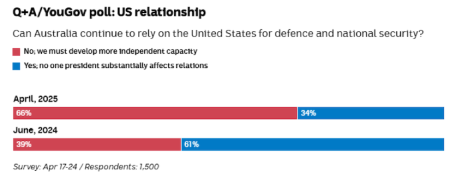
Of course, there are more options than just adding independent capacity, which suggests increased defence spending. We could, for example, be like New Zealand and exert independence without beefing up the military. Or we could develop strategic alliances with other nations that would complement our own capacities. We could indeed entirely reimagine our defence strategy, all without paying hundreds of billions of dollars for a handful of nuclear submarines set to be delivered at some indeterminate time in the distant future.
Opposition Leader Peter Dutton has falsely accused the Labor Government of cutting $80 billion from defence spending (AAP FactCheck showed the ALP had, in fact, increased spending by $50 billion) and the Coalition are generally perceived as stronger on national security. So, a cynic might accuse YouGov of push polling on behalf of the Liberal Party here, especially given neither of the major parties has suggested readjusting their bilateral AUKUS policy.
Nevertheless, the result is a welcome sign of a flowering of Australia’s underdeveloped sense of independence, given that the increase in the ‘No’ response has almost doubled from 39% in June 2024. That, despite the relative intransigence of Red and Blue, is a remarkable and noteworthy development in and of itself. How it may affect Saturday’s result, if at all, remains to be seen.
Question 2: Will Trump make Australia poorer?
They say elections are determined by the hip-pocket nerve, so if the Coalition could gather some shreds of comfort from the result of the defence question, the results of this question may well blow them to the wind. More than seven out of every ten voters polled by YouGov are concerned or very concerned that Trump’s policies will make Australia worse off. Note the graphic below.
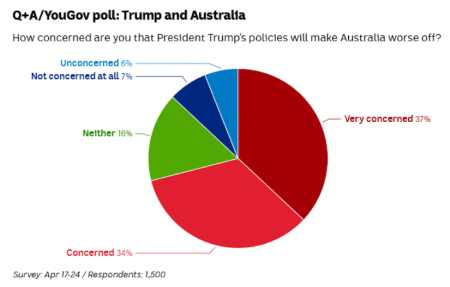
Given Dutton seems ill at ease on budget policy, has not released his costings, and is looking to cut spending and roll back tax cuts, it is difficult to see this as anything other than a win for the Labor Party. This, despite Dutton running particularly hard on cost-of-living issues, something that began under the previous government and has eased markedly under the Treasury administration of Jim Chalmers. It seems Dutton’s message is not cutting through, at least according to every official poll published during this campaign thus far.
Question 3: Which Australian leader will handle Trump better?
The results here are less emphatic than the first two questions, with only 55% of those polled saying PM Anthony Albanese is better placed to deal with Donald Trump than Peter Dutton. These results, however, are well within the margin of error of the tide of opinion polls on voting intention forthcoming during this Federal election period.
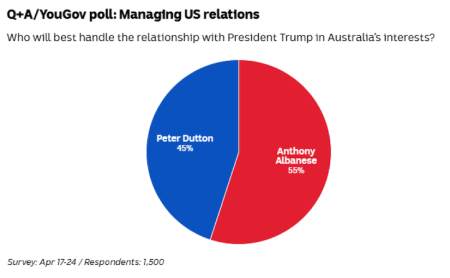
It seems almost self-evident that Australians, disaffected with a U.S. President who callously refuses to honour loyal, longstanding allies, instead slapping them with an unwarranted 10% tariff, would prefer to go with a leader who has stood up to Trump on this matter. They do not want an alternative leader who has publicly lauded Trump and aped many of his policies, so much so that he is scornfully derided as Australia’s “Temu Trump”. In this, Australians are again showing welcome signs of independence and willingness to adapt to change.
It is pertinent to note that only one government since 1931 has been bundled out of power after only a single term. Based on the YouGov results, it would be astounding if the second would occur almost a century later, on Saturday.
WHERE ARE WE NOW?
There are many important issues to be decided at this election. Do we want nuclear power, cuts to the public service, tax cuts for lower-to-middle income Australians, effective action on climate change, homelessness and housing affordability, and effective action on climate change, including increasing the adoption of cleaner renewables over fossil fuels, to name but a few? But all of these are in some way contingent on a stable and secure global economy and strategic environment. Without a sufficiently settled world, action on climate change and raising up the poor, for example, is well-nigh unachievable.
Hence, if the YouGov poll proves accurate, it may mark of watershed in Australia’s history. Where the Australian people decide, both individually and collectively, to exercise a spirit of independence, rather than following in the footsteps of our forelock-tugging forefathers. The issues are complex and nuanced, and IA does not presume to be some kind of hoary sage, able to predict the best path forward for our beloved nation.
However, both major political parties seem tethered to following the well-trodden path laid out for them — one of supplication to a more powerful foreign power. First, it was Britain, then during World War II, our dominion status was willingly superseded to the United States of America by John Curtin’s Labor Party.
It was a bold decision and the right one for the time. But the times have changed. They are changing very rapidly indeed, in paths hard to predict.
Independent Australia believes in a free and fair Australia, one that determines its own destiny and can stand in the world of nations as an equal, not as some sort of “deputy sheriff” for a mightier power. Perhaps one path Australia’s newfound independence may assist is to foster strategic alliances with our nearest neighbours to enhance collective security in our region. All these neighbours, such as New Zealand, PNG, the South Pacific Islands and South East Asia, are similarly blessed with Australia’s advantages of being relatively isolated from the world’s major trouble spots and surrounded by a vast marine moat. They are also – as Australians now appear to be – more interested in independent security than that contingent on enlisting in powerful allies’ far-flung foreign adventures.
And by becoming more independent, Australia might be able to play the role of a more honest broker in world affairs, rather than usually abstaining from acting in such a role due to pressure from its imperial overlord. We note here the Labor Government’s weak response to the ongoing war crimes in Palestine, which can only be the result of pressure on Australia from the U.S. to protect Israel, its major military ally.
Australians, like our Canadian and European allies, want our leaders to be bold and put Australia's needs before those of the United States of America, now governed by a despot whose actions cannot be predicted and will certainly only benefit his agenda. We want them to show true strength of leadership, not emulate the faux strength of a bully like Trump.
It is not the role of this publication to advise people how to vote. However, we believe that the best election result for the nation would be a hung parliament with a Labor Government — one with principled and progressive crossbenchers to add democracy to our parliament, untainted by ambitions that may result in espousing causes they do not believe in, to toe the party line.
The second best would be a majority Labor Government. Labor led us on a new path under Curtin. They seem, out of the two major parties, the most likely to lead us from the perilous path we now face to a safer course. The worst result, in our view, would be a Dutton Government. In the words of former Prime Minister Malcolm Turnbull, he is a thug and a bully. And while we would not presume to describe him as unintelligent, it’s safe to say he does not appear to be a deep thinker. And it will require some sagacity to safely traverse the rapids we foresee rising in front of our nation today.
We hope that, however Australians vote, they will vote for Australia, not as Trumpeting patriots, but as a positive part of a wider community of people, as an integral part of the common weal, for humanity and for that which unites us, not that which renders us apart.
* YouGov asked respondents several other questions, mostly about their views on various trade policies, such as counter-tariffs Australia might consider employing in a hypothetical trade war against the might of the United States. IA saw these as being so unlikely and unfeasible as to negate the need for further discussion.
Follow Dave Donovan on X/Twitter @davrosz and Bluesky @davrosz.bsky.social, Michelle Pini on Bluesky @michellepini.bsky.social and Independent Australia on Bluesky @independentaus.bsky.social, X/Twitter @independentaus and Facebook HERE.
 This work is licensed under a Creative Commons Attribution-NonCommercial-NoDerivs 3.0 Australia License
This work is licensed under a Creative Commons Attribution-NonCommercial-NoDerivs 3.0 Australia License
Support independent journalism Subscribe to IA.

Related Articles
- EDITORIAL: Trump poll of patriots shows independent Australia a hot election issue
- Dutton rides MAGA wave as PM pitches promise
- AUSVOTES ECONOMIC FACTS #14: Labor victory a good investment
- AUSVOTES ECONOMIC FACTS #13: Superannuation hits high under Labor
- AUSVOTES ECONOMIC FACTS #12: Housing affordability on the mend


